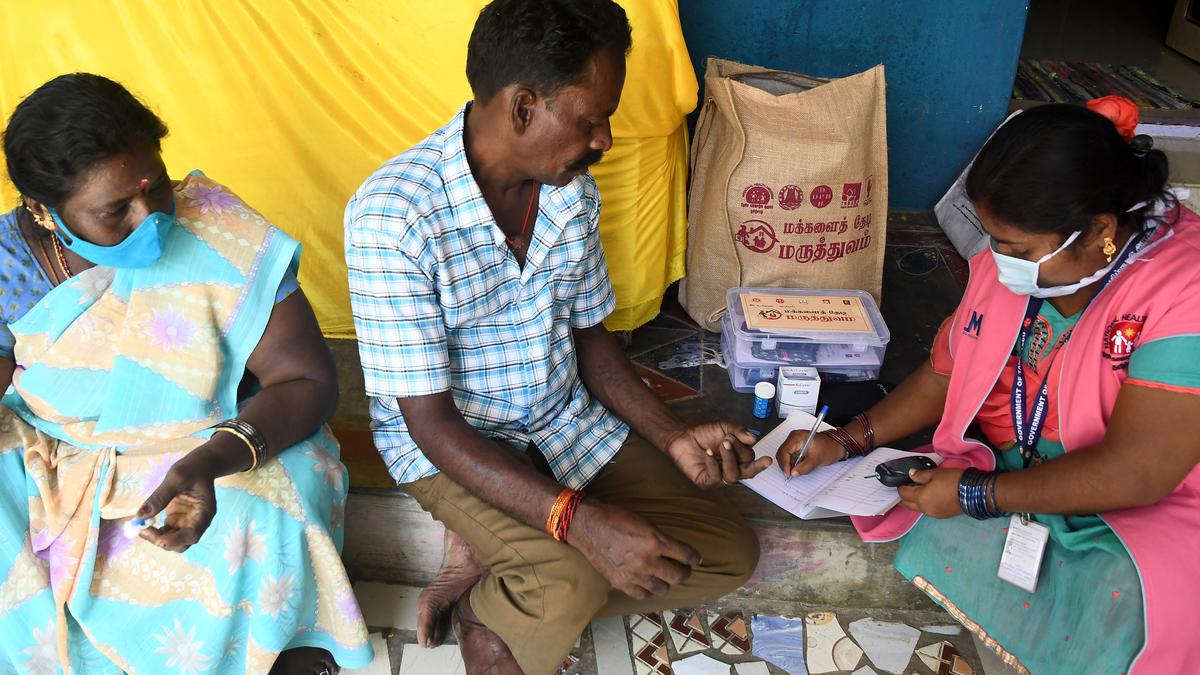
Taking healthcare to the people: the complete MTM experience
The Hindu
Tamil Nadu's Makkalai Thedi Maruthuvam (MTM) is a path-breaking project providing surveillance and intervention for health needs of its people. It has improved accessibility, early detection of diabetes/hypertension, and reduced out-of-pocket expenditure. Challenges remain, such as human resources, data accuracy, drug delivery, and evaluating outcomes. WHVs, VHNs, and digital tools can help ensure lifelong compliance and address prevention, reducing NCD burden and healthcare costs.
A path-breaking massive surveillance and intervention project, the Tamil Nadu government’s Makkalai Thedi Maruthuvam (MTM) is definitely an example of how a welfare state would take care of the health requirements of its people. No doubt, the scheme has made an impact, especially among patients of the rapidly growing non-communicable diseases (NCDs). Improving accessibility to healthcare services for many, early detection of diabetes and hypertension, and reduction in out-of-pocket expenditure are among its successes. But, as all massive, population-based projects go, there are some gaps and shortfalls, starting with human resources, accuracy of data and equipment, drug delivery, and a larger need to evaluate the outcomes so far, especially the hypertension and diabetes-control rates.
Taking home-based screening and drug delivery to the doorstep of beneficiaries is no small exercise.MTM, which will complete two years in August, is a massive programme involving lakhs of beneficiaries and a nearly 20,000-strong workforce. The scheme was recently profiled by the World Health Organization (WHO) for its outreach. As of July 20, official data show around 5.50 crore individuals were screened — 1,00,55,514 first-time beneficiaries and 3,20,53,880 repeat-service beneficiaries — though it is reliably learnt that the actual line-list would be lesser.
So what brought up the need for such a large-scale initiative? A survey in 2020 — the WHO’s STEP-wise approach to NCD risk factor surveillance — put the prevalence of hypertension and diabetes mellitus among the adult population of Tamil Nadu at 33.9% and 17.6% respectively. The findings of the survey, coupled with the disruption in health services, challenges in patients reaching health facilities for follow-up and receiving drugs for hypertension and diabetes because of the COVID-19 pandemic, prompted the government to launch MTM, aimed at doorstep delivery of health services.
Health Secretary Gagandeep Singh Bedi lists the achievements so far: skilled health workers delivering quality and people-centered care, reduction in out-of-pocket expenditure and financial risk protection, improved health service coverage and outcomes through availability and accessibility, greater equity, social inclusion and cohesion, community participation, and social accountability. The State Planning Commission, in a survey of 6,856 persons across the State, documented that MTM increased healthcare access for the poor. Before the scheme was launched, only one-third of the people of low-income groups were screened for diabetes and hypertension. The number rose to nearly 50% after its implementation. The survey found that the scheme helped to cut out-of-pocket medical expenses, especially for those in low-income groups; expenses have halved for these groups after the scheme started operating.
Soumya Swaminathan, chairperson, MSSRF, Chennai, said MTM is a good scheme in terms of finding people who have NCDs in the community and treating them. “I have heard from people, particularly the elderly, that it was convenient to receive the medications at their doorstep. But the programme does not address prevention. In order to make a dent in NCDs at the population level in the long term, we need to address the root causes; risk factors, like unhealthy diet, lack of physical activity and air pollution,” she said.
Lifelong compliance with treatment has to be ensured and this is where digital tools can really help. “Adding the prevention component will help the State reduce the burden of chronic diseases, thereby reducing healthcare costs and help people lead healthy and good quality lives. While MTM screens for hypertension and diabetes, we also have a huge burden of mental health issues that need to be addressed as well,” she added.
A public health expert, who is familiar with the scheme, agrees that MTM has solved the problem of access for people living in remote areas and elderly patients. “On the positive side, doorstep screening enhances accessibility to healthcare services, making it easier for individuals, especially those in rural and underserved areas, to undergo regular screenings. Early detection of NCDs such as diabetes, hypertension, and cardiovascular diseases allows for timely intervention, lifestyle modifications and treatments, potentially reducing the severity and progression of these conditions. By reaching out to individuals who may otherwise not seek medical attention, doorstep screening helps in identifying risk factors and promoting preventive measures, reducing the overall burden of NCDs in the State,” he explains.





















 Run 3 Space | Play Space Running Game
Run 3 Space | Play Space Running Game Traffic Jam 3D | Online Racing Game
Traffic Jam 3D | Online Racing Game Duck Hunt | Play Old Classic Game
Duck Hunt | Play Old Classic Game











